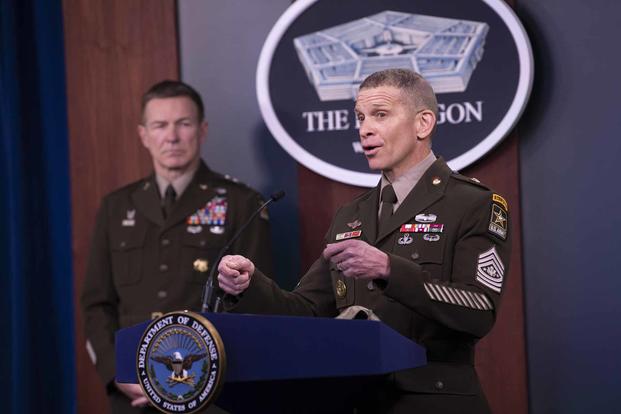Steve Beynon

Online, so-called mandatory training -- a set of roughly a dozen courses soldiers are typically tasked with completing annually, including training on securing military facilities and information, ethics, equal opportunity and safety courses -- is time-consuming. Some in the force view the courses as a distraction from more important tasks, like combat training.
Senior leaders have a solution: Skip the classes.
"Don't do it," Sergeant Major of the Army Michael Grinston told soldiers at a conference Tuesday. "Set priorities for your organization and fight for it."
Army senior leaders want commanders to stop hounding their soldiers to complete the mandatory online training, part of a broader shift away from the Global War on Terrorism era and toward ramping up training for conventional warfare. That training is expected to be faster-paced and more complicated.
"I was a division commander for three years, and I never did this stuff," Gen. James McConville, the Army's chief of staff, told soldiers at a conference Tuesday, referencing the online training. "People actually do this stuff? You don't have time … and frankly, this is when senior leaders need to come in."
The classes are largely seen as a burden on the force, taking soldiers away from training and duties pertaining to their job, with most of the information covered in the online courses potentially included in more detailed training programs soldiers already must undertake. The online classes are also run off of clunky Defense Department websites that are known to crash often.
However, when it comes to some of the material covered in online classes, subject matter experts might not always be available to units for in-person training and certification, and the courses do provide a way for the Army to emphasize certain areas, like ethics, that can be important across a service member's career.
Not completing those courses isn't reflected on a soldier's record; instead, the data is usually shown exclusively in internal unit rosters for commanders to note who did the training. The only training that directly impacts the careers of enlisted troops are other lengthy online courses, needed to rise to the next rank.
"Is someone going to physically take that soldier [to complete the training]?" Grinston, the service's top enlisted leader, asked about forcing troops away from their regular duties. "It's usually the staff; it's rarely the battalion commander."
Army leaders want commanders to focus on other priorities, like a more difficult physical fitness and marksmanship test the service has rolled out, along with prioritizing tests for expert badges.
"What we have to do for junior subordinates is give them our priorities and make sure they have the time," McConville said. "Are you doing PT? Are you making sure your squads can do a night live fire?"
-- Steve Beynon can be reached at Steve.Beynon@military.com. Follow him on Twitter @StevenBeynon.
No comments:
Post a Comment